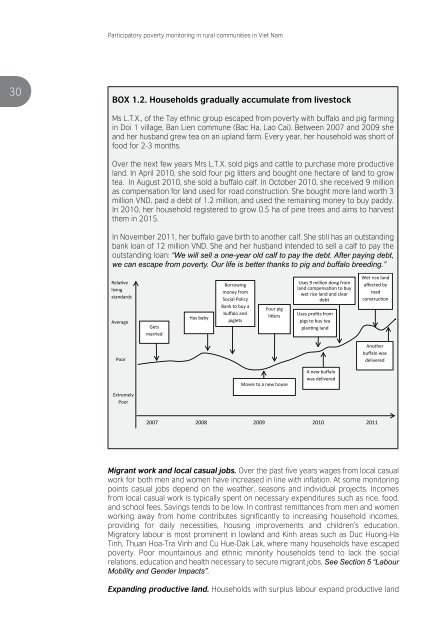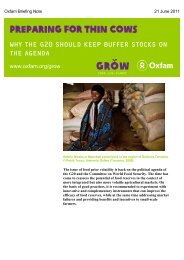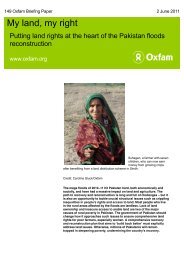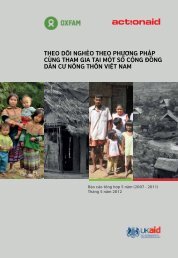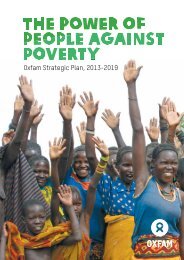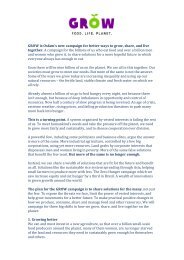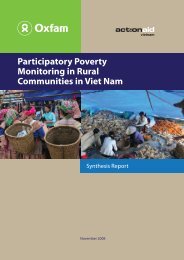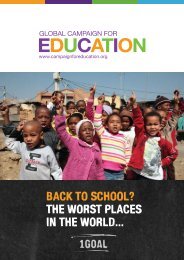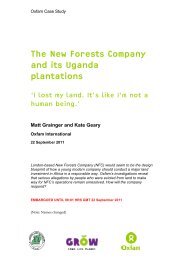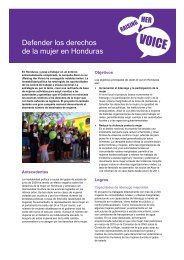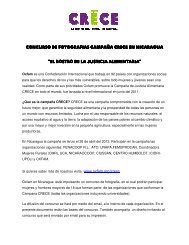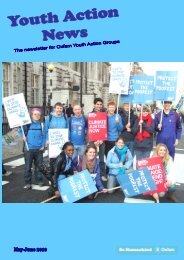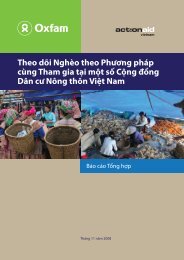Challenges to Rural Poverty Reduction in Viet Nam - Oxfam Blogs
Challenges to Rural Poverty Reduction in Viet Nam - Oxfam Blogs
Challenges to Rural Poverty Reduction in Viet Nam - Oxfam Blogs
Create successful ePaper yourself
Turn your PDF publications into a flip-book with our unique Google optimized e-Paper software.
Participa<strong>to</strong>ry poverty moni<strong>to</strong>r<strong>in</strong>g <strong>in</strong> rural communities <strong>in</strong> <strong>Viet</strong> <strong>Nam</strong><br />
30<br />
BOX 1.2. Households gradually accumulate from lives<strong>to</strong>ck<br />
Ms L.T.X., of the Tay ethnic group escaped from poverty with buffalo and pig farm<strong>in</strong>g<br />
<strong>in</strong> Doi 1 village, Ban Lien commune (Bac Ha, Lao Cai). Between 2007 and 2009 she<br />
and her husband grew tea on an upland farm. Every year, her household was short of<br />
food for 2-3 months.<br />
Over the next few years Mrs L.T.X. sold pigs and cattle <strong>to</strong> purchase more productive<br />
land. In April 2010, she sold four pig litters and bought one hectare of land <strong>to</strong> grow<br />
tea. In August 2010, she sold a buffalo calf. In Oc<strong>to</strong>ber 2010, she received 9 million<br />
as compensation for land used for road construction. She bought more land worth 3<br />
million VND, paid a debt of 1.2 million, and used the rema<strong>in</strong><strong>in</strong>g money <strong>to</strong> buy paddy.<br />
In 2010, her household registered <strong>to</strong> grow 0.5 ha of p<strong>in</strong>e trees and aims <strong>to</strong> harvest<br />
them <strong>in</strong> 2015.<br />
In November 2011, her buffalo gave birth <strong>to</strong> another calf. She still has an outstand<strong>in</strong>g<br />
bank loan of 12 million VND. She and her husband <strong>in</strong>tended <strong>to</strong> sell a calf <strong>to</strong> pay the<br />
outstand<strong>in</strong>g loan: “We will sell a one-year old calf <strong>to</strong> pay the debt. After pay<strong>in</strong>g debt,<br />
we can escape from poverty. Our life is better thanks <strong>to</strong> pig and buffalo breed<strong>in</strong>g.”<br />
Relative<br />
liv<strong>in</strong>g<br />
standards<br />
Average<br />
Gets<br />
married<br />
Has baby<br />
Borrow<strong>in</strong>g<br />
money from<br />
Social Policy<br />
Bank <strong>to</strong> buy a<br />
buffalo and<br />
piglets<br />
Four pig<br />
litters<br />
Uses 9 million dong from<br />
land compensation <strong>to</strong> buy<br />
wet rice land and clear<br />
debt<br />
Uses profits from<br />
pigs <strong>to</strong> buy tea<br />
plant<strong>in</strong>g land<br />
Wet rice land<br />
affected by<br />
road<br />
construction<br />
Poor<br />
Another<br />
buffalo was<br />
delivered<br />
Moves <strong>to</strong> a new house<br />
A new buffalo<br />
was delivered<br />
Extremely<br />
Poor<br />
2007 2008 2009 2010 2011<br />
Migrant work and local casual jobs. Over the past five years wages from local casual<br />
work for both men and women have <strong>in</strong>creased <strong>in</strong> l<strong>in</strong>e with <strong>in</strong>flation. At some moni<strong>to</strong>r<strong>in</strong>g<br />
po<strong>in</strong>ts casual jobs depend on the weather, seasons and <strong>in</strong>dividual projects. Incomes<br />
from local casual work is typically spent on necessary expenditures such as rice, food,<br />
and school fees. Sav<strong>in</strong>gs tends <strong>to</strong> be low. In contrast remittances from men and women<br />
work<strong>in</strong>g away from home contributes significantly <strong>to</strong> <strong>in</strong>creas<strong>in</strong>g household <strong>in</strong>comes,<br />
provid<strong>in</strong>g for daily necessities, hous<strong>in</strong>g improvements and children’s education.<br />
Migra<strong>to</strong>ry labour is most prom<strong>in</strong>ent <strong>in</strong> lowland and K<strong>in</strong>h areas such as Duc Huong-Ha<br />
T<strong>in</strong>h, Thuan Hoa-Tra V<strong>in</strong>h and Cu Hue-Dak Lak, where many households have escaped<br />
poverty. Poor mounta<strong>in</strong>ous and ethnic m<strong>in</strong>ority households tend <strong>to</strong> lack the social<br />
relations, education and health necessary <strong>to</strong> secure migrant jobs. See Section 5 “Labour<br />
Mobility and Gender Impacts”.<br />
Expand<strong>in</strong>g productive land. Households with surplus labour expand productive land


